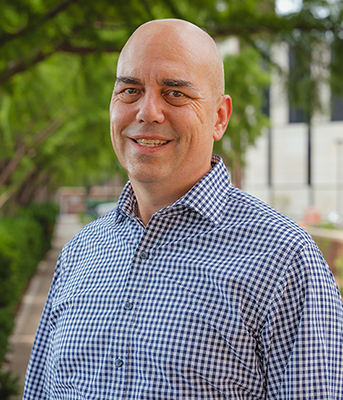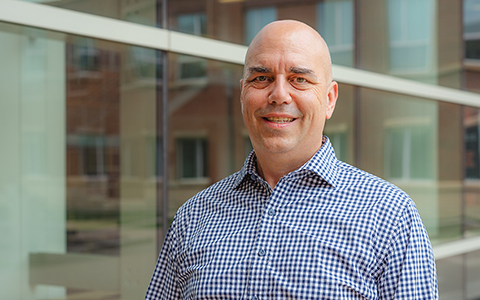Herbold’s approach to teaching Accountancy wins top award
Jul 30, 2025, 08:01 AM By

For his role in shaping accountancy curricula to meet the evolving needs of the profession, Gies Business Teaching Professor Josh Herbold, has been honored with the 2025 Outstanding Educator Award from the Illinois CPA Society. It recognizes Herbold’s contributions to developing innovative pedagogy and his deep understanding of the transformative forces reshaping the accounting world.
“Teaching is about more than delivering information—it’s about sparking curiosity and guiding students toward knowledge that will prepare them for success,” said Herbold, who also serves as the associate head of the Department of Accountancy at Gies Business. “Students entering accountancy are already intelligent and hard-working. Our role as educators is to make learning more efficient, organized, and impactful. We can’t make the world easier for them, but we can ensure they are ready to face its challenges.”
At Gies Business, Herbold is instrumental in preparing students for the complexities of modern accountancy. He teaches core courses Managerial Accounting (ACCY 503) and Data Analytics Foundations (ACCY 570) and has been integral in reshaping the department’s curricula to ensure that Gies remains at the forefront of accounting education.
A global detour shapes a professor’s calling
Herbold’s journey to academia was not a straight line. He grew up in the Chicago suburbs, part of a family of engineers, but discovered a knack for accounting while a member of the Future Business Leaders of America in high school. He initially explored both graphic design and accounting as potential career paths but ultimately pursued a business degree at the University of Illinois, drawn to its challenging curriculum.
Herbold became part of the first class of Project Discovery at Gies Business, an innovative program that exposed students to the broader, more strategic aspects of accounting and promoted interdisciplinary collaboration. Accounting Hall of Fame member Art Wyatt, one of the first faculty in Project Discovery, was the first to plant the seed that accounting wasn’t as straightforward as some believe.
“I quickly discovered that accounting is not just about adding and subtracting numbers, it’s about communication. And that piqued my curiosity,” said Herbold. “It was interesting and fun and something I could make a living at. I ended up tutoring a lot of my friends in accounting and business courses.”
Herbold’s interest in teaching solidified after graduation. Instead of accepting an offer from one of the major accounting firms, he took a gap year to teach English to Japanese high school students.
“All the firms were happy to postpone offers, but while I was there I realized that teaching is my calling,” said Herbold. “I learned how to connect with gifted students who were expected to study in the top colleges and also those living in a fishing village who might never leave it.”
The experience became a turning point. He returned to Gies Business, earning his PhD in Accountancy in 2005, then joined the accounting faculty of the University of Montana. He was one of six full-time accounting faculty teaching 200 students, which became a microcosm of what he’s faced as part of the Gies Business accounting department’s leadership team. He learned first-hand the intricacies of attracting and retaining students and keeping the curriculum relevant to recruiters.
Since his return to Gies Business in 2019, Herbold has taught managerial accounting and data analytics. His writing reflects his forward-thinking perspective, focusing on topical subjects such as performance evaluation bias for remote workers, the impact of corporate board gender diversity, and the implications of artificial intelligence on auditing practices.

Balancing core principles with new approaches
Herbold’s dedication to connecting academia to the professional world is a cornerstone of his teaching philosophy.
“When students see that what they’re doing in the classroom directly applies to their future careers, they become more engaged and excited to learn,” said Herbold. “My role is to help make those connections and support them as they prepare to enter—and shape—the profession.”
Nasim Nosirov, who earned both a master’s in management and law degree from the University of Illinois, said Herbold shared practical examples and assigned truly memorable projects, including one where he set up his own business on Etsy.
“Professor Herbold is famously strict about deadlines and in his managerial accounting class you don’t just learn accountancy, you learn accountability,” said Nosirov, who is COO of Numeo AI, a Silicon Valley startup developing AI agents for logistics companies. “His rigorous approach and real-world assignments gave me the confidence to analyze cost structures, forecast revenues, and make data-driven decisions from day one.”
Herbold encourages fellow faculty members to integrate relevant real-world applications into their curricula. When it comes to incorporating artificial intelligence into the classroom, he thinks we’re at an inflection point.
“There’s always a tension; you don’t want to change a class for every fad, so you are always striving to strike a balance,” said Herbold. “The core principle of accounting – having accurate information for making business decisions – will remain the same, but the types of information we have access to, how we gather it, and what we do with it is constantly changing.”
Preparing students for the “Wild West” of AI
The integration of AI further complicates the landscape. New hires are now performing tasks traditionally assigned to third-year associates, but accounting firms struggle with how to teach a process effectively if junior associates aren't executing the task manually.
"As firms experiment with integrating AI into processes, they’ve created a ‘Wild West’ where no single best approach for junior associates has emerged,” said Herbold. “Some believe it’s important to learn a process by hand for a few days or weeks while others think it’s enough to explain the basics of the concept.”
Herbold anticipates further evolution within the accounting profession as the pathways to CPA licensure expand. The goal is to attract more students to the profession and fill the gap created in the pipeline by an estimated 300,000 CPAs who left public accounting during the pandemic. Gies offers several ways to earn the required hours to sit for the CPA exam.
Although it’s challenging to study and prepare to take the exam while in a first job, Herbold believes the long-term career options it offers are worth it.
“New hires are now doing the work that more experienced employees did only a few years ago, and academia will play a crucial role in bridging the learning gap that this creates,” said Herbold, who said he wakes up excited about teaching everyday – knowing that an understanding of accounting can be a life-changing experience. “It’s been very rewarding to play a small role in helping students and the profession rise to the challenges ahead.”
